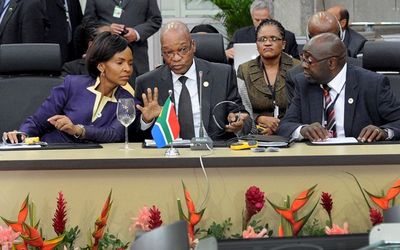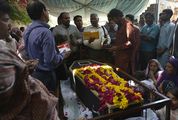Brics nations to host bank headquarters in Shanghai
by Raymond Colitt,
2014-07-17 07:48:47.0
BRASILIA — Leaders of the five Brics (Brazil, Russia, India, China and South Africa) nations agreed on the structure of a $50bn development bank by granting China its headquarters and India its first rotating presidency. Brazil, Russia and South Africa were given posts or units in the new bank.
The leaders also formalised the creation of a $100bn currency exchange reserve, which member states can tap in case of balance of payment crises, according to a statement issued at a summit in Fortaleza, Brazil.
Both initiatives, which require legislative approval, are designed to provide an alternative to financing from the International Monetary Fund (IMF) and the World Bank, where Brics countries have been seeking more say.
The measures coincide with a slowing of growth in the five countries to about 5.4% this year from 10.7% in 2007, according to economists surveyed by Bloomberg.
"The Brics are gaining political weight and demonstrating their role in the international arena," Brazilian President Dilma Rousseff said after a signing ceremony.
Until the eve of the summit, India and South Africa had vied with China to host the headquarters of the bank, dubbed the New Development Bank, whose membership may eventually be extended to other countries.
Russia’s Finance Minister Anton Siluanov told reporters that the Brics decided in favour of Shanghai because the city offers better infrastructure, opportunities to capture private funding, and is home to more investors than the competitors.
Each member country got something out of the deal.
The first chairman of the board of governors will be from Russia, while the first chairman of the board of directors will be Brazilian.
South Africa will establish an African regional centre for the bank, which may not get off the ground for two years, according to Carlos Cozendey, secretary for international affairs at Brazil’s finance ministry.
Founding Brics members have equal voting rights. Of the total subscribed capital, $40bn are callable shares. Payment of the remaining $10bn of paid-in shares will be made over seven years.
Unlike the IMF and World Bank, which are managed by Europeans and Americans, the Brics bank "is quite democratic", Brazilian Finance Minister Guido Mantega said.
Yet the idea was not to compete with the IMF but complement them, Ms Rousseff said.
Each member country has the right to withdraw different amounts from the joint currency reserves, according to a statement from Brazil’s central bank.
China can withdraw half the amount it earmarks, or $20.5bn. Brazil, Russia, and India may withdraw the same amount they commit, or $18bn, while South Africa can tap $10bn, twice its contribution.
Bloomberg

TALKS: President Jacob Zuma flanked by International Relations and Co-operation Minister Maite Nkoana Mashabane, left, and Finance Minister Nhlanhla Nene, right, at the Brics summit in Brazil. Picture: GCIS
BRASILIA — Leaders of the five Brics (Brazil, Russia, India, China and South Africa) nations agreed on the structure of a $50bn development bank by granting China its headquarters and India its first rotating presidency. Brazil, Russia and South Africa were given posts or units in the new bank.
The leaders also formalised the creation of a $100bn currency exchange reserve, which member states can tap in case of balance of payment crises, according to a statement issued at a summit in Fortaleza, Brazil.
Both initiatives, which require legislative approval, are designed to provide an alternative to financing from the International Monetary Fund (IMF) and the World Bank, where Brics countries have been seeking more say.
The measures coincide with a slowing of growth in the five countries to about 5.4% this year from 10.7% in 2007, according to economists surveyed by Bloomberg.
"The Brics are gaining political weight and demonstrating their role in the international arena," Brazilian President Dilma Rousseff said after a signing ceremony.
Until the eve of the summit, India and South Africa had vied with China to host the headquarters of the bank, dubbed the New Development Bank, whose membership may eventually be extended to other countries.
Russia’s Finance Minister Anton Siluanov told reporters that the Brics decided in favour of Shanghai because the city offers better infrastructure, opportunities to capture private funding, and is home to more investors than the competitors.
Each member country got something out of the deal.
The first chairman of the board of governors will be from Russia, while the first chairman of the board of directors will be Brazilian.
South Africa will establish an African regional centre for the bank, which may not get off the ground for two years, according to Carlos Cozendey, secretary for international affairs at Brazil’s finance ministry.
Founding Brics members have equal voting rights. Of the total subscribed capital, $40bn are callable shares. Payment of the remaining $10bn of paid-in shares will be made over seven years.
Unlike the IMF and World Bank, which are managed by Europeans and Americans, the Brics bank "is quite democratic", Brazilian Finance Minister Guido Mantega said.
Yet the idea was not to compete with the IMF but complement them, Ms Rousseff said.
Each member country has the right to withdraw different amounts from the joint currency reserves, according to a statement from Brazil’s central bank.
China can withdraw half the amount it earmarks, or $20.5bn. Brazil, Russia, and India may withdraw the same amount they commit, or $18bn, while South Africa can tap $10bn, twice its contribution.
Bloomberg
























Change: -0.47%
Change: -0.57%
Change: -1.76%
Change: -0.34%
Change: 0.02%
Data supplied by Profile Data
Change: -1.49%
Change: -0.01%
Change: -0.47%
Change: 0.00%
Change: -0.08%
Data supplied by Profile Data
Change: 0.61%
Change: 0.85%
Change: 0.20%
Change: -0.22%
Change: 0.82%
Data supplied by Profile Data
Change: 0.27%
Change: -0.42%
Change: 0.13%
Change: -1.22%
Change: -1.88%
Data supplied by Profile Data